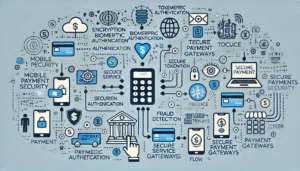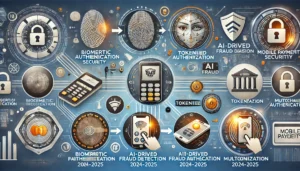Understanding Mobile Payment Security

According to Allied Market Research, the global mobile payment market reached an unprecedented $2.1 trillion in 2023, highlighting the critical importance of robust security measures.
Mobile payment security represents the cornerstone of digital financial transactions, encompassing multiple layers of protection designed to safeguard sensitive financial data. As transaction volumes surge, the complexity of security challenges evolves, making ethical hacking an essential component in identifying and addressing vulnerabilities before they can be exploited.
Core Security Components:
- Tokenization protocols
- End-to-end encryption
- Biometric authentication
- Real-time fraud detection
The mobile payment security landscape continues to evolve with emerging technologies and threats. Understanding these dynamics is crucial for both developers and users, as the system’s integrity relies on constant vigilance and proactive security measures.
Critical Considerations:
- 🔐 Multi-factor authentication implementation
- 🔒 Secure element storage
- 📱 Device fingerprinting
- 🔍 Continuous transaction monitoring
Important: As mobile payment adoption accelerates, the sophistication of security measures must evolve proportionally to maintain trust and protect user assets.
Common Vulnerabilities in Mobile Payment Systems
- Phishing Attacks: One of the primary vulnerabilities in mobile payment systems involves phishing, where attackers create fake websites or emails to trick users into supplying sensitive information. These scams can lead to unauthorized access to payment apps, resulting in financial loss. Recent statistics indicate that mobile phishing attempts increased by 37% in the last year alone.
- Malware: Malicious software designed to infect mobile devices can access and steal payment data. Such malware often disguises itself within seemingly legitimate apps. According to the latest data, over 2 million users worldwide were affected by mobile payment breaches related to malware in the past 12 months.
- Unsecured Wi-Fi: Public Wi-Fi networks pose significant mobile payment security challenges. Without encryption, these networks can be easily intercepted by attackers, allowing them to snoop on transactions. It’s essential for users to avoid conducting financial transactions over unsecured networks.
- Outdated Software: Not updating your mobile operating system or payment apps can leave known vulnerabilities in mobile payment systems unpatched. Attackers exploit these known weaknesses to gain unauthorized access. Recent reports highlight that 40% of mobile payment breaches could have been prevented by timely software updates.
Ethical Hacking Methodology for Mobile Payment Platforms
Ethical hacking for fintech platforms, particularly mobile payment systems, requires a structured approach to identify vulnerabilities and strengthen security. Our team of expert hackers follows a step-by-step methodology to conduct penetration testing and provide actionable recommendations.
- Information Gathering: We begin by gathering information about the mobile payment platform, including its architecture, features, and potential vulnerabilities. This involves reviewing publicly available information, analyzing network traffic, and conducting interviews with stakeholders.
- Vulnerability Scanning: Next, we use specialized tools to scan the platform for known vulnerabilities, such as those listed in the OWASP Mobile Security Project. This helps us identify potential entry points for malicious actors.
- Penetration Testing: Our team conducts simulated attacks on the platform to test its defenses and identify vulnerabilities that may not have been detected by automated scanning tools. This includes attempting to bypass security controls, inject malicious code, and exploit vulnerabilities.
- Exploitation and Post-Exploitation: Once a vulnerability is identified, we attempt to exploit it to gain access to sensitive data or systems. We then analyze the platform’s response to the attack and identify potential weaknesses in its incident response plan.
- Reporting and Recommendations: Finally, we provide a detailed report of our findings and recommendations for remediation. This includes prioritizing vulnerabilities based on their severity and providing guidance on implementing security patches, configuring systems, and improving incident response procedures.
By following this structured approach to ethical hacking for fintech platforms, we help ensure the security and integrity of mobile payment systems.
Examining real-world scenarios underscores the impact of ethical hacking on enhancing security. These case studies demonstrate how proactive security measures lead to substantial improvements:
Case Study 1: Financial Institution Vulnerability Detection
A major financial institution partnered with an ethical hacking firm to assess the security of their mobile payment system. The hackers identified a critical vulnerability that could have allowed attackers to intercept and modify transactions. By addressing the issue, the institution prevented significant financial losses and maintained customer trust. This demonstrates the value of mobile payment security through ethical hacking.
Case Study 2: E-commerce Platform Security Enhancement
A popular e-commerce platform experienced a series of security breaches, leading to customer data compromise. They engaged ethical hackers to conduct penetration testing. The hackers uncovered multiple vulnerabilities in the platform’s authentication and authorization mechanisms. Implementing the recommended security enhancement measures significantly strengthened the platform’s security posture and restored user confidence.
Case Study 3: IoT Device Vulnerability Mitigation
A leading IoT device manufacturer contracted a security firm to assess the vulnerability of their smart home devices. The ethical hackers discovered a flaw that could have allowed remote access and control of the devices. Through responsible disclosure and prompt remediation, the manufacturer mitigated a potentially widespread security risk, ensuring both device and user safety. This shows how proactive security measures can enhance security significantly.
These case studies highlight the tangible benefits of ethical hacking. Independent security firms like NCC Group and Bishop Fox have published extensive research demonstrating the effectiveness of penetration testing and vulnerability assessments in identifying and mitigating security risks. By proactively identifying weaknesses, organizations can strengthen their defenses and protect their assets.
Best Practices
Implementing robust security measures is crucial for safeguarding your mobile e-commerce platform. Based on ethical hacking insights, the following best practices can help you enhance your security posture and protect against potential threats.
- Implement Strong Authentication MechanismsUtilize multi-factor authentication (MFA) to ensure that only authorized users have access to sensitive areas of your system. Enforce the use of complex passwords and consider biometric authentication for added security.
- Encrypt Data Transmission and StorageEmploy SSL/TLS protocols to encrypt data during transmission between clients and servers. Secure sensitive information, such as customer payment data, by using strong encryption algorithms when storing it. This practice is a cornerstone of mobile e-commerce secure payment practices.
- Regularly Update and Patch SystemsKeep all software, including operating systems and applications, up to date with the latest security patches. Regular updates prevent attackers from exploiting known vulnerabilities.
- Conduct Regular Security Audits and Penetration TestingPerform periodic security assessments to identify and remediate vulnerabilities. Ethical hacking techniques can uncover weaknesses before malicious actors exploit them. This proactive approach aligns with effective mobile e-commerce secure payment practices.
- Secure Payment GatewaysEnsure that your payment processing methods comply with the Payment Card Industry Data Security Standard (PCI DSS). Secure payment gateways protect customer financial information and build trust in your platform.
- Educate Employees and UsersProvide training for staff on security best practices and raise awareness about social engineering attacks. Educate customers on recognizing phishing attempts to enhance overall security.
For more detailed information on security measures, consider reviewing Springer’s security guidelines, which offer comprehensive insights into safeguarding e-commerce platforms.
Schedule a security assessment today to identify potential vulnerabilities and fortify your mobile e-commerce platform against threats.
Future Trends in Mobile Payment Security

According to Next Move Strategy Consulting, the integration of quantum-resistant cryptography in mobile payments is expected to grow by 287% by 2025, revolutionizing the future of mobile payment security.
Key Security Innovations
- Quantum Computing Defense: Implementation of post-quantum cryptography
- AI-Powered Authentication: Behavioral biometrics and continuous authentication
- Blockchain Integration: Decentralized payment verification systems
- Zero-Trust Architecture: Enhanced verification protocols
“The convergence of AI and ethical hacking trends is creating unprecedented opportunities for proactive security measures in mobile payments. We’re moving from reactive to predictive security models.”
– Dr. Maya Patel, Cybersecurity Research Director
2024
- Widespread adoption of behavioral analytics
- Integration of 5G security protocols
2025
- Quantum-safe encryption deployment
- Autonomous security systems
Emerging Challenges:
- 🔄 Cross-platform security coordination
- 🎯 Advanced social engineering attacks
- 💻 IoT payment security integration
- 🔐 Privacy regulations compliance



